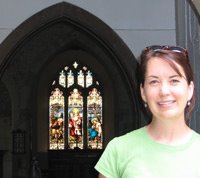4: Jane's men
The love stories in Austen’s own life echo these themes, but without the “happily ever after” ending. She may have loved, but never married. You could say her love life was a comedy of errors, if it weren’t also a bit tragic, and terribly scant. But there seem to have been a few significant men in Austen’s life.
The first – her young love – was Tom Lefroy. Jane was twenty. Tom was visiting from Ireland, and was the nephew of Austen’s good friend and mentor Anne Lefroy. They danced and Jane flirted. The attachment was mutual, but he was quickly sent home, married someone with an appropriately large fortune, had seven children, and went on to become Lord Chief Justice of Ireland. If Jane wrote about family interference, she learned it firsthand.
Then there was Revd. Samuel Blackall, a somewhat ridiculous clergyman her friend Anne hoped she would form an attachment with (perhaps a model for Mr. Collins?). Jane could never see him as anything but slightly ridiculous.
The next significant relationship was a man from the neighborhood, Harris Bigg-Wither, the younger brother of Jane’s good friends. He was an excellent and prudent match, set to inherit a good estate. He proposed one night when Jane and her sister Cassandra were visiting. She accepted him, then apparently stayed up much of the night reconsidering, withdrew her consent in the morning, and hastily left the house in disgrace. Apparently, there was money, but no love, and for Jane, that would never do.
There are rumors of another, of a man Jane and her sister met when vacationing in Devon. He expressed some interest which Jane apparently returned. But though the sisters expected to hear from him, they only received news of his death. The tour guides may tell you that he was a clergyman, that he was expected to pursue this relationship, that Cassandra thought he would be successful if he did pursue. The biographers say only that Cassandra recalled him later in life, that they met him one summer and he asked to see them the next summer (which doesn’t sound terribly promising) and then he died.
Cassandra’s own fiance died of fever in the West Indies, and the two sisters were widely thought to have rushed themselves into middle age, seemingly content and determined to remain spinster aunts to all of their brothers’ many children.
Perhaps if Jane had married, home life and children would not have left enough time to write, and she would have never given us Elizabeth and Darcy, Emma and Mr. Knightley, Anne and the dashing Capt. Wentworth.
Austen’s brother and nephew make light of these romantic experiences, praising Austen’s incredible imagination and proclaiming that her heart was never touched. But no woman who has fallen in love at twenty or contemplated marrying a man she didn’t truly love can believe that Jane was emotionally removed from these situations. They may seem small and unimportant, but in her life, they were cornerstone events, things that determined the course of her life.



2 Comments:
Lori, found your blog through the Austen blog. Have you ever taken the NYU course they offer at Oxford? It's a week on Jane Austen. I've always wanted to do it. I look forward to reading more installments. Agreed with you also about the new P&P.
Thanks, Elizabeth. I've not done the NYU course, but it sounds great. I loved Oxford. Highly recommend it!
Post a Comment
<< Home